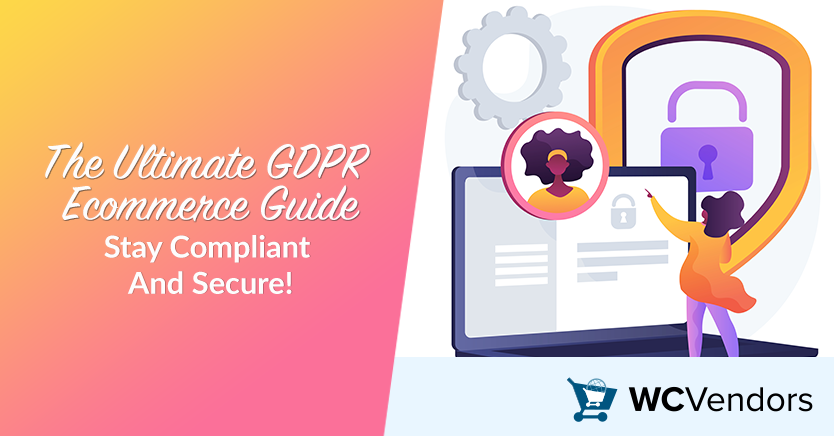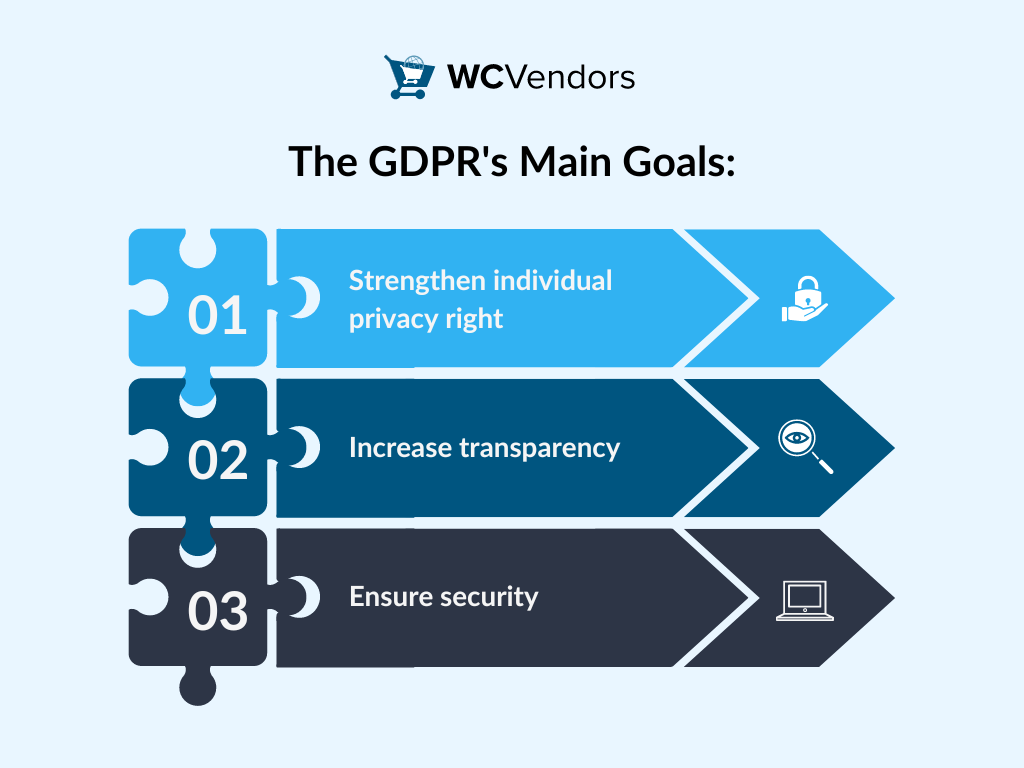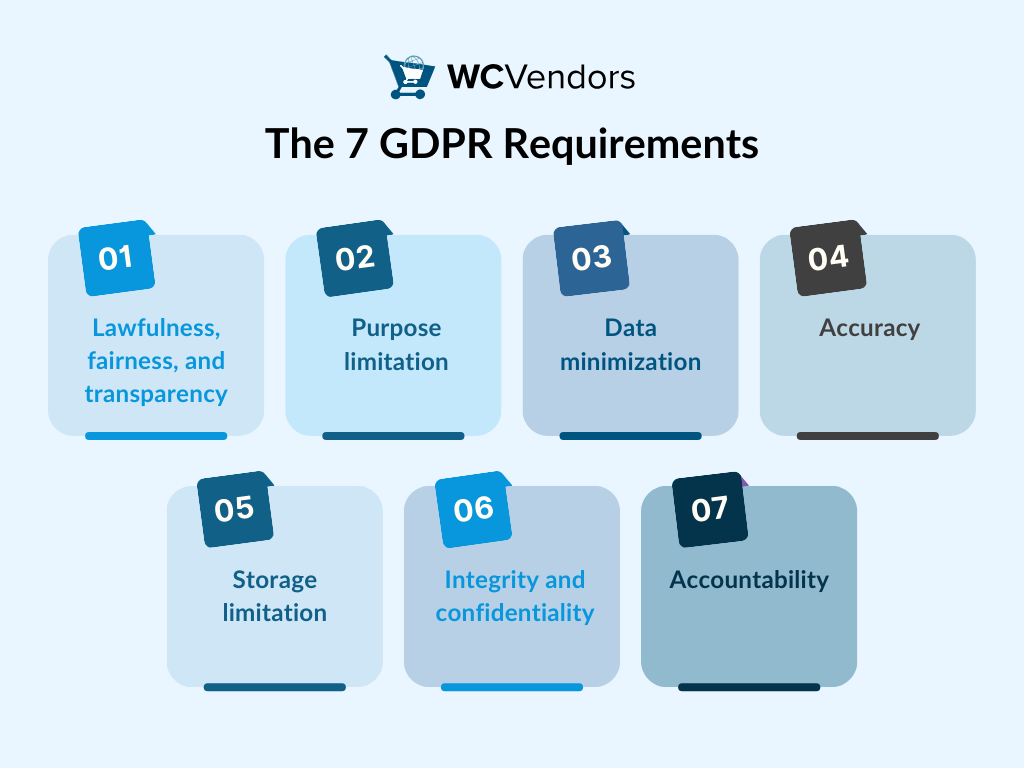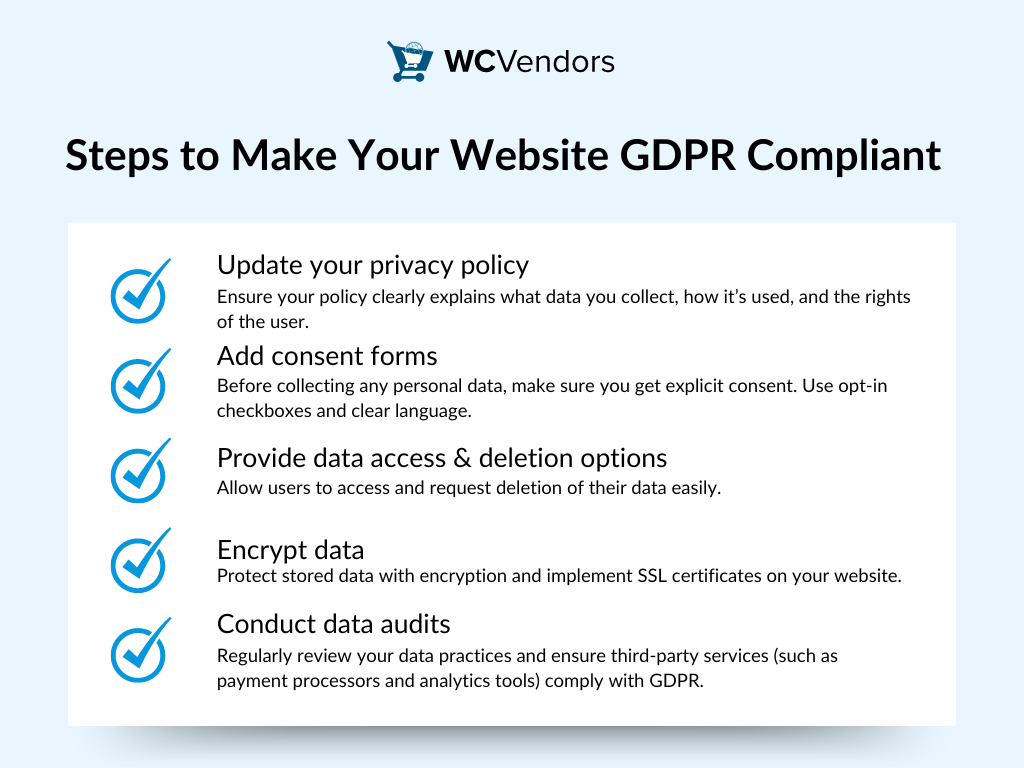
With the rise of online shopping, the importance of GDPR eCommerce compliance for businesses has skyrocketed.
The General Data Protection Regulation (GDPR) was introduced by the European Union in 2018 to address these concerns. For online businesses, including eCommerce, GDPR eCommerce sets rules to protect customer data. It ensures personal information is collected, stored, and used safely. The guidelines also make sure businesses are clear about how they handle data. Pretty straightforward, right?
But what does GDPR actually mean for your business? More importantly, how can you make sure your eCommerce store is compliant while maintaining smooth operations?
Let’s break it down step by step with this GDPR eCommerce checklist. Read on further!
What Is GDPR?
GDPR, or General Data Protection Regulation, is a law that helps people control their personal information. It applies to any business, no matter where it’s located, if they collect or use data from people in the EU.
The law sets clear rules on how businesses should handle this data. If they don’t follow these rules, they could face big fines.
The GDPR’s main goals are to:
- Strengthen individual privacy rights: Give consumers more control over how their personal data is used.
- Increase transparency: Businesses must be upfront about the type of data they collect and how they intend to use it.
- Ensure security: Data must be protected against unauthorized access and breaches.
A key part of GDPR is getting clear permission from people before you collect their data. Businesses must ask for this consent upfront. This means no more pre-ticked boxes or vague consent forms.
For eCommerce businesses, GDPR covers many areas. It affects how you collect customer information during a sale. It also impacts how you manage email marketing and customer accounts.

But we’ll dive deeper into how it applies specifically to eCommerce in the next section!
What is GDPR in eCommerce?
When it comes to eCommerce, GDPR has a significant impact. As an online store owner, you gather different types of personal information from customers. This includes names, addresses, emails, and payment details.
For example, if you collect customer data for marketing, you must get clear permission first. You also need to let them opt out anytime they want. In addition, make sure all data activities, like using third-party payment services, follow GDPR rules. This is especially important when using Standard Contractual Clauses (SCCs) for sending data internationally.
In eCommerce, GDPR applies to several key activities:
- Data collection: Every time a customer places an order or signs up for a newsletter, you are gathering personal data. Under GDPR, you must provide clear information on what data you are collecting and why. You also need explicit consent from your customers to process this data.
- Data storage: Storing customer data for future use? GDPR requires you to ensure that this data is securely stored and only kept for as long as necessary. Storing data beyond its useful life is not allowed under GDPR.
- Marketing activities: Email marketing is a big part of eCommerce. Under GDPR, customers have to choose to receive marketing emails. Basically, this means you can’t sign them up automatically anymore—you need their permission first. Additionally, you must offer an easy way for customers to unsubscribe at any time.
- Right to be forgotten: If a customer requests that their data be deleted, you must comply. This could be a customer who no longer wishes to have an account with you or someone who doesn’t want their purchase history stored.
Now, let’s explore the specific rules you need to follow to maintain compliance in eCommerce!
What Are The 7 GDPR Requirements?
GDPR may seem overwhelming, but at its core, it is about ensuring that businesses handle personal data responsibly. The 11-chapter EU GDPR document details all legal obligations, but these seven principles form the foundation of GDPR compliance:

- Lawfulness, fairness, and transparency: Your customers must always know what data you’re collecting and why. The data must be collected legally and used fairly.
- Purpose limitation: Only collect personal data for a specific, legitimate purpose.
- Data minimization: Only gather the data you actually need for that purpose.
- Accuracy: Keep personal data accurate and up to date.
- Storage limitation: Don’t store data longer than necessary.
- Integrity and confidentiality: Protect the data from breaches and leaks.
- Accountability: You are responsible for how personal data is handled, both by your company and any third parties involved.
Following them builds a foundation of trust with your customers. Can you believe that not doing so could lead to severe penalties?
Let’s dive deeper into how these principles apply to eCommerce.
Does GDPR Apply To US Consumers?
A common question from eCommerce businesses is whether GDPR applies to companies outside the EU. GDPR protects the data of people in the EU. Any business that collects, uses, or stores data from EU residents must follow the rules, no matter where they are based. So, even if your eCommerce store is in the US, you must follow GDPR if you market to or sell to EU customers.
If you target EU customers through marketing, your website, or shipping, your eCommerce store must follow GDPR rules. In short, you need to make sure everything is compliant.
This means you must protect customer data, get clear permission, and let them access or delete their personal information. It might seem like a lot, but once you understand the basics, it gets easier. Pretty clear, right?
What Are The 4 Rules Of GDPR?
Though GDPR is based on seven core principles, when it comes to the practical implementation of GDPR for eCommerce, four key rules stand out. These rules help clarify how you should collect and manage personal data on your website:
- Data collection: Only collect the data you absolutely need. GDPR doesn’t allow excessive or irrelevant data collection.
- Consent: Customers must give explicit consent for their data to be processed. Consent must be a clear affirmative action—no pre-checked boxes.
- Data access: Customers have the right to access their data at any time. They can request to see what data you have about them, and you must provide it.
- Right to be forgotten: Your customers can request the deletion of their personal data, and you are obligated to comply unless there are legitimate grounds for retaining it.
These four rules form the backbone of your GDPR compliance efforts, ensuring the secure and ethical handling of customer data.
Who Does The GDPR Affect In ECommerce Business?

GDPR is not limited to businesses within the EU—it affects any business that processes the data of EU residents. In an eCommerce context, this includes:
- Online retailers: Any business that sells goods or services online to EU customers.
- Marketplaces: Platforms that allow third-party vendors to sell products, such as multi-vendor marketplaces.
- Subscription services: Sites that collect email addresses or offer memberships, including newsletters and loyalty programs.
- B2B platforms: Sites that collect and process business data from EU-based companies.
Imagine a U.S.-based online store that ships products worldwide. If the store has customers from Germany, it must comply with GDPR. This applies when collecting personal data, such as names, shipping addresses, and payment information. Even though the business operates outside the EU, it still has to follow GDPR rules. This is because it processes data from EU residents.
GDPR requires the store to protect customer data and obtain explicit consent. It also gives customers the right to access or delete their personal information.
Whether you run a small eCommerce store or a large multi-vendor marketplace, GDPR applies if you have EU customers. It’s important to integrate compliance into your processes. This helps you avoid fines and build trust with your EU customers.
How Can You Make Your Website Compatible With GDPR Law?
Making your eCommerce site GDPR compliant requires a few specific actions. While GDPR can seem daunting, here’s a checklist to make your journey smoother:

- Update your privacy policy: Ensure your policy clearly explains what data you collect, how it’s used, and the rights of the user.
- Add consent forms: Before collecting any personal data, make sure you get explicit consent. Use opt-in checkboxes and clear language.
- Provide data access & deletion options: Allow users to access and request deletion of their data easily.
- Encrypt data: Protect stored data with encryption and implement SSL certificates on your website.
- Conduct data audits: Regularly review your data practices and ensure third-party services (such as payment processors and analytics tools) comply with GDPR.
For multi-vendor marketplaces, this checklist extends to your vendors. They must also follow GDPR rules when collecting data from their customers. It’s essential that vendors use proper consent forms, manage customer data securely, and provide easy options for data access and deletion. As the marketplace owner, you should guide your vendors through the process and ensure they have the tools needed for GDPR compliance.
Now that you know how to make your site compliant, let’s look at the impact of GDPR on marketplaces and why it’s even more critical for platforms with multiple vendors.
The Impact Of GDPR On Marketplaces
While GDPR impacts all eCommerce businesses, it presents unique challenges for multi-vendor marketplaces. With multiple sellers operating under one platform, data processing activities can become fragmented, making compliance more difficult. As the marketplace owner, you need to ensure that:
- Vendors understand their responsibilities under GDPR.
- Your marketplace has tools for managing data processing consent.
- Customers can access, correct, and delete their data, regardless of which vendor they purchased from.
- You provide guidance on how third-party integrations should be handled to maintain GDPR compliance.
How WC Vendors supports GDPR compliance
Let’s take WC Vendors as an example. If you’ve built your multi-vendor marketplace using WC Vendors, you’ll have access to specific features that can help you and your vendors manage some aspects of GDPR compliance, particularly when it comes to securely processing customer data.

WC Vendors offers tools such as:
- Automated Payments with Stripe Connect: This feature allows you to handle vendor payments securely and in compliance with GDPR. WC Vendors Stripe Connect gateway supports Strong Customer Authentication (SCA), which is important for handling sensitive customer payment data.
- Vendor Management: WC Vendors offers detailed vendor management features, allowing marketplace owners to control vendor access, assign roles, and manage permissions. By limiting access to sensitive customer data based on vendor roles, this feature contributes to GDPR’s data minimization principle.
- Order Management: This feature allows vendors to manage customer orders, but personal customer data related to these orders is securely stored within WooCommerce. Ensuring vendors handle this data responsibly aligns with GDPR’s principles of data protection and data security.
- Vendor Memberships: This feature allows you to create and manage memberships for vendors, controlling who can access the marketplace. With proper control over vendor access, you can limit the exposure of customer data, indirectly supporting GDPR’s accountability principle.
These features help ensure that both marketplace owners and vendors can manage customer data securely and responsibly, aligning with key GDPR principles.
While these tools offer a foundation for compliance, it’s important to implement additional measures, such as privacy policies and consent management, to fully meet GDPR requirements.
Conclusion
Ensuring your eCommerce business is compliant with GDPR is not only a legal requirement but also an essential step toward building trust with your customers. By following GDPR guidelines, you can protect customer data, enhance transparency, and create a more secure marketplace.
Whether you’re running a small online store or managing a multi-vendor platform, understanding the key aspects of GDPR will help you navigate the complexities of data protection more effectively.
To make sure you’re on track, here’s what you need to remember:
- Definition Of GDPR
- What Is GDPR in eCommerce?
- What Are The 7 GDPR Requirements?
- Does GDPR Apply To US Consumers?
- What Are The 4 Rules Of GDPR?
- Who Does The GDPR Affect On eCommerce Business?
- How Can You Make Your Website Compatible With GDPR Law?
- The Impact Of GDPR On Marketplaces
By focusing on these key areas, you’ll be well-prepared to navigate GDPR and keep your business compliant. If you need further guidance or have any questions, feel free to reach out—we’re here to support you!
